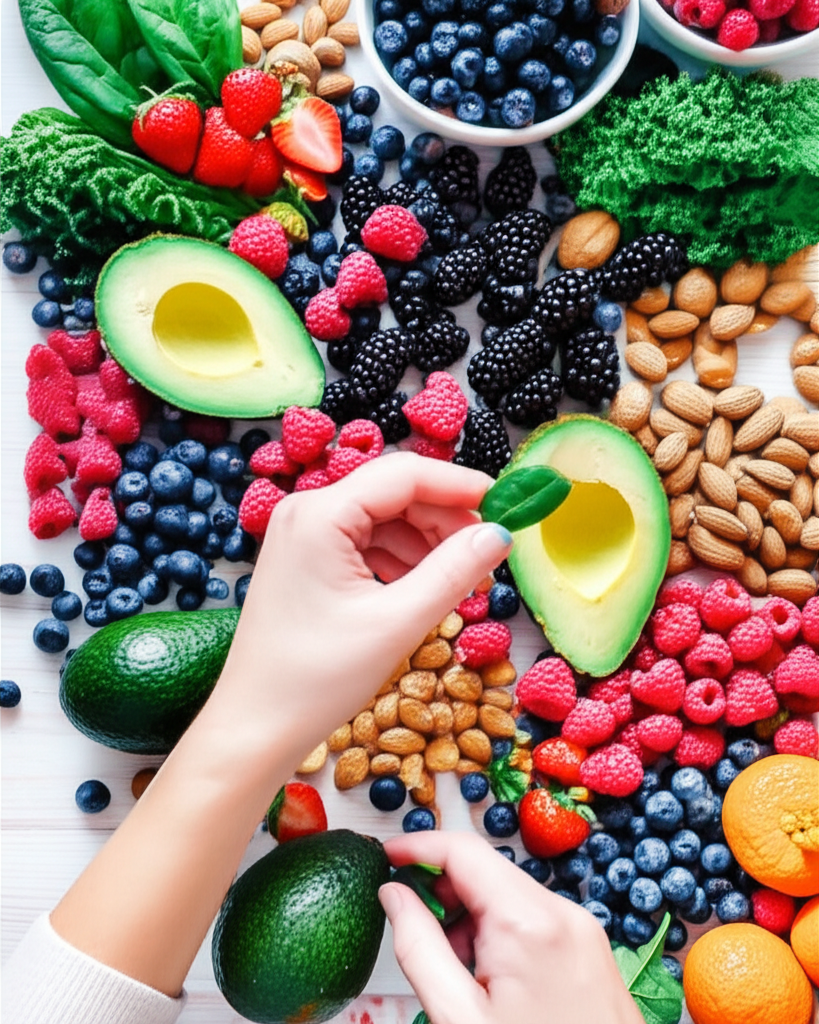Now Reading: Nutrition for Better Mood & Mental Health
-
01
Nutrition for Better Mood & Mental Health
Nutrition for Better Mood & Mental Health

Eating for Your Mood: Simple Nutrition Tips for Better Mental Health
Have you ever noticed how certain foods make you feel energized and vibrant, while others leave you feeling sluggish or even a little…off? It’s not just your imagination, my friend! There’s a powerful, undeniable connection between what we eat and how we feel – both physically and mentally. Our brains, like any other vital organ, need the right fuel to function optimally, impacting everything from our focus and energy to our emotional balance and overall mood.
In a world where mental health challenges are increasingly common, finding accessible, supportive ways to nurture our well-being is more important than ever. This isn’t about strict, restrictive diets or complicated scientific jargon. Instead, think of this as a gentle guide to making simple, supportive food choices that can genuinely uplift your mood and foster greater resilience. Consider this a friendly chat about how to nourish your brain and body, one bite at a time, with kindness and understanding.
The Gut-Brain Axis: Your Second Brain & Its Mood Connection
It might sound surprising, but the journey to better mental health often begins in your gut. Yes, your digestive system is far more than just a food processor; it’s intricately linked to your brain through what scientists call the gut-brain axis.
What is the Gut-Brain Axis?
Imagine a superhighway connecting your gut and your brain, allowing them to communicate constantly. That’s essentially the gut-brain axis. This bidirectional communication system involves an intricate network of nerves, hormones, and your immune system. What’s even more fascinating is that many of the neurotransmitters we associate with mood – like serotonin (often called the “feel-good” chemical) and dopamine – are actually produced and stored in your gut! A healthy gut environment directly supports their optimal production and function, making this fascinating connection truly profound.
Why Gut Health Matters for Mental Health:
Your gut is home to trillions of bacteria, viruses, and fungi, collectively known as your microbiome. When your microbiome is balanced and healthy, it supports everything from digestion to immune function. However, an imbalanced or unhealthy microbiome can lead to inflammation, which has been linked to various mood disorders, including depression and anxiety symptoms. Nurturing your gut health is a foundational, powerful step in your journey to improved mental well-being through nutrition.
Mood-Boosting Nutrients: What Your Brain Craves
Just as a car needs the right type of fuel, your brain thrives on specific nutrients. Incorporating these into your diet can make a significant difference in your eating for mood journey. Let’s explore some key players and easy ways to enjoy them!
Complex Carbohydrates for Stable Energy:
Please don’t be afraid of carbs! The right kind – complex carbohydrates – are essential for a stable mood. Found in whole grains (like oats, brown rice, quinoa), fruits, and vegetables, they provide a steady, slow release of glucose, which is your brain’s primary energy source. This helps prevent those uncomfortable energy crashes that can lead to irritability or a dip in mood. Plus, complex carbs help your body produce serotonin, contributing to feelings of calmness and happiness.
Actionable Tip: Swap white bread for whole-grain versions, add a half-cup of cooked quinoa to your salad, or enjoy a bowl of oatmeal with berries for breakfast. These simple changes make a big impact!
Omega-3 Fatty Acids: Your Brain’s Best Friend:
These are truly mood-boosting nutrients. Omega-3 fatty acids, particularly EPA and DHA, are crucial building blocks for brain cells. They have powerful anti-inflammatory properties and play a vital role in brain structure and function. Research consistently links a diet rich in Omega-3s to reduced depression and anxiety symptoms.
Actionable Tip: Consider making fatty fish like salmon, mackerel, or sardines a regular on your dinner plate, perhaps twice a week. If fish isn’t your preference, a sprinkle of ground flaxseeds or chia seeds in your morning smoothie, yogurt, or oatmeal is a wonderful and easy way to boost your intake. Walnuts are also a great plant-based source for snacking!
B Vitamins: The Energy & Mood Regulators:
B vitamins (especially B6, B9/folate, and B12) are like the unsung heroes of your nervous system. They are critical for neurotransmitter synthesis and help convert food into energy, directly impacting your overall energy levels and emotional balance.
Actionable Tip: Start your day with an egg and a side of spinach, or choose a whole-grain bread for your sandwich to get a good dose. Load up on leafy greens like kale and Swiss chard, incorporate legumes, and enjoy lean meats if they’re part of your diet.
Magnesium: The Calming Mineral:
Often called “nature’s tranquilizer,” Magnesium plays a role in over 300 biochemical reactions in the body, including those that regulate stress and promote relaxation. It can help with stress reduction and even improve sleep quality, both vital for mental well-being.
Actionable Tip: Reach for a handful of almonds or cashews as a satisfying snack, or add some black beans or lentils to your chili, soup, or salad. A simple square of dark chocolate (70% cocoa or higher) can also be a delightful source!
Antioxidants: Protecting Your Brain:
Your brain is highly susceptible to oxidative stress, which can damage cells and contribute to mood disorders. Antioxidants, found in abundance in colorful fruits and vegetables, act as protective shields, neutralizing harmful free radicals and reducing inflammation.
Actionable Tip: Make your plate a rainbow! Aim to include a variety of brightly colored fruits and veggies at each meal. Think a handful of blueberries in your yogurt, bell peppers in your stir-fry, or a vibrant spinach salad with dinner. The more colors, the better!
Probiotics & Prebiotics: Nurturing Your Gut Microbiome:
Remember our talk about the gut-brain axis? Probiotics are beneficial bacteria that contribute to a healthy gut microbiome, while prebiotics are the fibers that feed these good bacteria. Boosting your intake of probiotics and prebiotics directly supports your gut health, which in turn, supports your mood boost.
Actionable Tip: Embrace fermented foods! A small daily serving of plain Greek yogurt, kefir, sauerkraut, or kimchi can introduce beneficial bacteria. Pair these with prebiotic-rich foods like garlic, onions, bananas, and oats – perhaps a banana in your probiotic-rich yogurt, or some sautéed onions with your meal – to nourish your gut’s friendly inhabitants. How about a simple Berry & Yogurt Parfait with Chia Seeds for breakfast? It combines probiotics, prebiotics, and omega-3s in one delicious bite!
Simple Nutrition Tips for Everyday Well-being
Knowing which food for mood is beneficial is one thing; putting it into practice is another. Here are some simple nutrition tips for mental health to weave into your daily life without feeling overwhelmed:
Prioritize Whole, Unprocessed Foods:
This is perhaps the most impactful change you can make. Aim to reduce highly processed foods, excessive sugar, and refined carbohydrates (like white bread and pastries), which can cause blood sugar spikes and crashes that negatively affect mood. Instead, focus on fresh fruits, vegetables, lean proteins (chicken, fish, legumes), and healthy fats (avocado, olive oil, nuts). These provide a steady stream of nutrients for consistent energy and better emotional regulation.
Practical Idea: Instead of highly processed snacks, try an apple with a tablespoon of nut butter, or a handful of homemade trail mix.
Hydration is Key:
It sounds so simple, but dehydration can profoundly impact your mood, focus, and energy levels. Make sure you’re drinking enough water throughout the day. Your brain function depends on it!
Practical Idea: Keep a stylish reusable water bottle with you as a gentle reminder to sip throughout the day. If plain water feels boring, try infusing it with cucumber, lemon, or berries.
Mindful Eating Practices:
How you eat is almost as important as what you eat. Try to slow down, savor your food, and pay attention to your body’s hunger and fullness cues. Mindful eating can help you enjoy your meals more, improve digestion, and reduce the likelihood of emotional eating due to stress or boredom.
Practical Idea: Before you start eating, take a moment to notice the colors, textures, and aromas of your food. Chew slowly and really taste each bite. Put your fork down between bites to give yourself time to register satisfaction.
Consistent Meal Times:
Eating at regular intervals throughout the day can help stabilize your blood sugar levels, preventing those sharp drops that can lead to irritability, fatigue, and difficulty concentrating. Aim for balanced meals and snacks every few hours.
Practical Idea: Try to build a rhythm, perhaps aiming for breakfast within an hour of waking, lunch mid-day, and dinner in the evening, with a couple of healthy snacks in between if needed. Your body will thank you for the predictability!
Small, Sustainable Changes:
Remember, this isn’t about perfection. Starting with small, sustainable changes is far more effective than trying to overhaul your entire diet overnight. Every little bit truly helps.
Practical Idea: Don’t feel pressured to completely transform your kitchen today. Start with one simple change, like adding an extra serving of vegetables to dinner tonight, or swapping out your sugary afternoon drink for water. Once that feels natural, add another!
Plan Ahead for Success:
When life gets busy, healthy eating can feel challenging. A little planning can go a long way. This reduces the temptation of less supportive options when hunger strikes.
Practical Idea: Batch cook some quinoa or grilled chicken on Sunday, or chop up veggies for easy snacking during the week. Stock your pantry with readily available healthy snacks like nuts, seeds, and fruit. This makes healthy choices the easy choices!
Beyond Food: Complementary Habits for Mental Health
While eating for your mood is a powerful tool, it’s part of a larger picture of self-care. The benefits of good nutrition tips for mental health are amplified when combined with other practices that support your mental well-being and resilience:
- Regular physical activity: Even a short walk outdoors can release endorphins, reduce stress, and clear your mind.
- Adequate sleep: Aim for 7-9 hours of quality sleep each night for optimal brain repair, emotional regulation, and overall vitality.
- Stress management techniques: Practices like mindfulness meditation, deep breathing exercises, or journaling can significantly aid stress reduction and promote inner calm.
- Social connection: Nurturing relationships and spending quality time with loved ones can combat feelings of isolation, foster a sense of belonging, and naturally boost your mood.
Conclusion
Taking care of your mental health is a journey, not a destination, and your plate can be a powerful, compassionate ally on that path. By making conscious, kind choices about the food for mood that fuels your body, you’re truly investing in your own well-being, fostering greater emotional balance, and building incredible resilience from the inside out.
Remember, you don’t need to be perfect. Start small, be gentle and kind to yourself, and listen to what your unique body needs. Experiment with these nutrition tips for mental health strategies, and notice how even seemingly minor changes can profoundly impact how you feel day-to-day. You are absolutely worth the effort of nurturing yourself from the inside out. Embrace this journey with an open heart and a curious mind!
What are your favorite mood-boosting foods or simple nutrition changes that have made a difference for you? Share your insights and inspire others in the comments below!

















